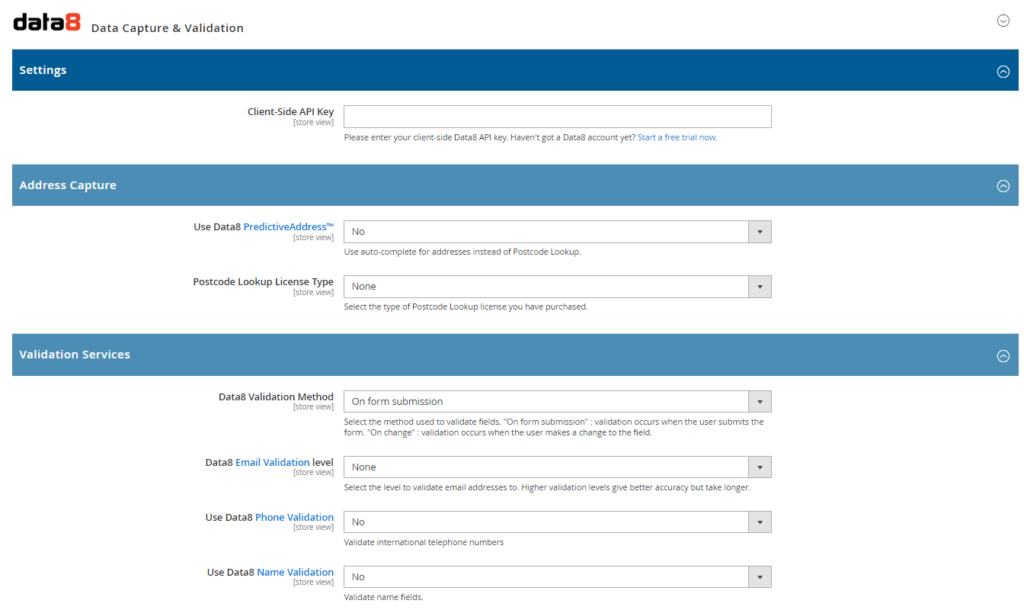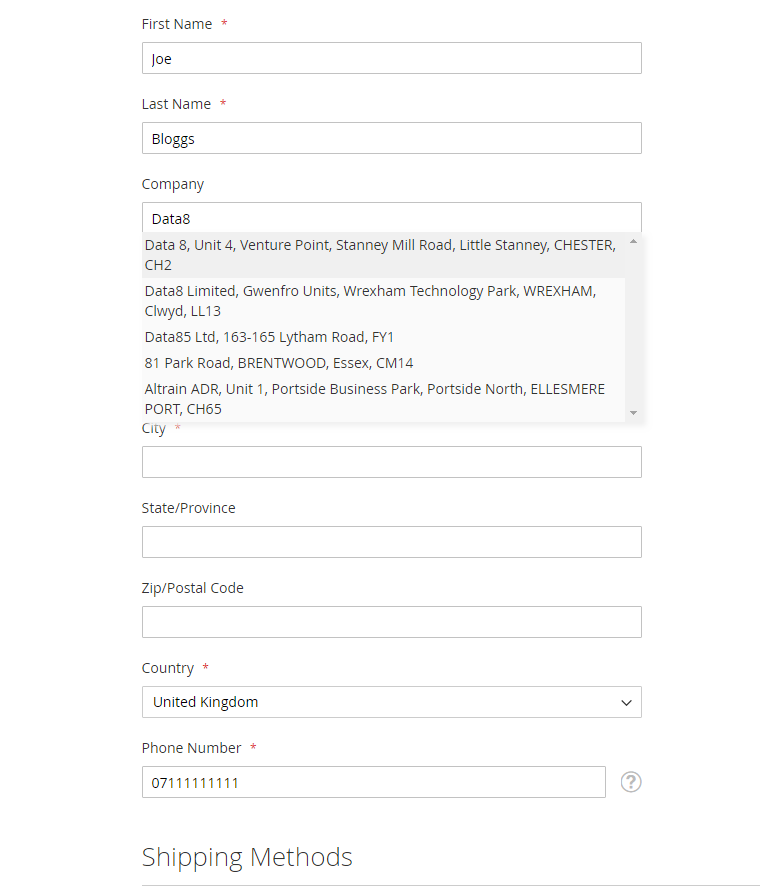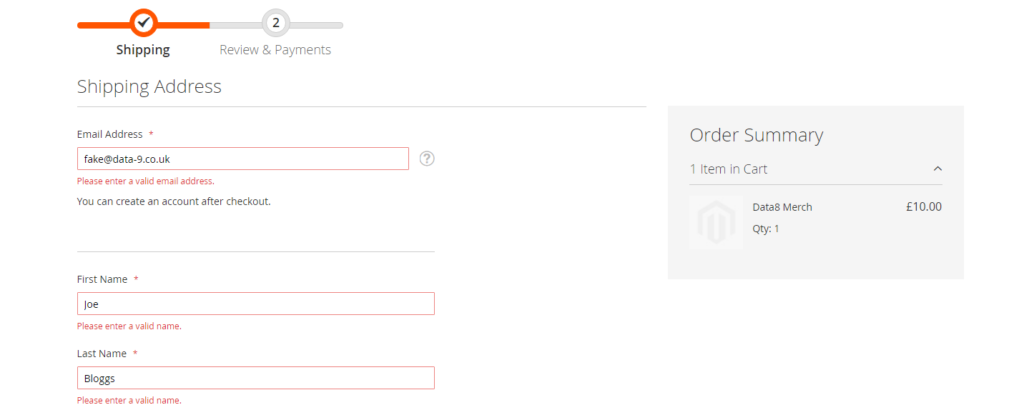Home » Resources » How-to Guides » Magento Installation Guide
Magento (Adobe Commerce) Installation Guide

Find Data8’s Magento Installation Guide here to get started with your data validation journey. Our plugin for Magento supports the following features:
- PredictiveAddress
- Postcode Lookup
- Phone Validation
- Email Validation
- Name Validation
Magento Plugin Compatibility
Our Magento plugin applies real-time validation to forms across your site.
The following versions have been tested for compatibility:
| Magento |
|---|
| 2.1.16 |
| 2.2.7 |
| 2.3.0 |
| 2.3.1 |
| 2.3.4 |
| 2.3.5 |
| 2.4.1 |
| 2.4.2 |
Installation
To install the Data8 Magento plugin on your site, search the Magento Marketplace for ‘data8’ and follow the installation wizard after completing the free checkout. Once installed, you can access the settings page for the plugin from the left-side menu by clicking ‘Stores’ > ‘Configuration’ > ‘Data8’ > ‘Data Capture & Validation Settings’.
Should you ever wish to uninstall the Data8 Magento Plugin, from the left side menu click ” and then ‘Module Manager’. From here you will see a list of all installed modules. You can disable or delete the Data8 plugin to remove it from your site.
Configuration
From the Data8 settings page (Stores > Configuration > Data8 > Data Capture & Validation) you can enable and choose the validation options that suit your needs.

On the configuration screen, enter your client-side API key found on your Data8 Dashboard. Each validation service requires the necessary credits to function.
PredictiveAddress Options
When the PredictiveAddress service is enabled, the PredictiveAddress Options box will become visible. This box can be left blank to use the default configuration of PredictiveAddress. However, should you wish to customise your integration, you can do so by entering any combination of the options available for the PredictiveAddress service.
For example, enter the following into the PredictiveAddress options box to detect the initial country in the PredictiveAddress search, from the users IP address:
initialCountry: auto
PredictiveAddress ///what3words integration
You can search for any 3 word address by simply typing out the three words like so “pitch.tells.civil”.
If you wish to store the 3 word address that was used to retrieve the final address, add the class data8_what3words to an input field to indicate where we should store the what3words address.
If you wish to use what3words to get a more precise latitude and longitude, you will need to pass in the options:
includeLocation: true
includeWhat3Words: true
and then add the classes: data8_latitude and data8_longitude to some text inputs to indicate where to store the returned data.
Usage
After entering your configuration details and clicking save, the relevant enhanced data capture and validation will be applied to various data entry points around your site, including:
- Checkout – Email Validation, Phone Validation, Postcode Lookup, PredictiveAddress
- Creating a new account – Email Validation
- Editing account information – Email Validation
- Adding/editing address book entries – Phone Validation, Postcode Lookup, PredictiveAddress
- Newsletter subscriptions – Email Validation
Validation can also be applied to custom forms or fields. The following rules can be used to attach Data8 Validation to acceptable fields:
- Email: Either a field name attribute containing
emailor a text input of typeemail. - Telephone: Either a field name attribute containing
phoneor a text input of typetel. - Name: A field name attribute containing
name,firstnameorlastname(excludingusername). - Address (PredictiveAddress and Postcode Lookup): Fields must use the below structure.
company: id and name = "company"
street 1: id and name = "street_1"
street 2: id and name = "street_2"
city: id and name = "city"
county: id and name = "region"
postcode: id and name = "zip"
Postcode Lookup
When Postcode Lookup is enabled, a button will appear next to postcode fields, which allows users to enter a postcode and then view available results, which makes entering addresses quick and easy.
PredictiveAddress
When PredictiveAddress is enabled, any suitable address entry section on your forms will have use of our address autocomplete and verification tool. Simply begin typing an address/postcode/company name into the Address line 1 box to start searching and narrowing down results.

Validation
If entered data is identified as invalid, the error will be highlighted suitably on the form.
When Phone Validation is enabled, all suitable telephone number fields are validated automatically. The Default Country Code option can be used to specify the ISO 2-character country code or international dialling code of the country to validate the telephone number in, unless the telephone number contains an explicit country code prefix.
When Email Validation is enabled, all suitable email address fields are validated automatically. The level of validation to apply to entered email addresses can be selected from a drop down on the settings page. See the table below for information on each level.
Email Validation Levels:
| Level | Description |
|---|---|
| Syntax | The supplied email is checked to ensure that it meets the standard email address format. This is the quickest option and would reject such incorrect email addresses as “noone@nowhere” and “N/A”, but would accept incorrect email addresses that are correctly formed but that do not include a valid domain name such as “[email protected]”. |
| Domain | The supplied email is checked to ensure that the domain name (the part to the right of the @ sign) exists and is set up to receive email. This is still normally very quick, but can take a few seconds in some cases. This check would reject incorrectly formatted email addresses in the same way as the Syntax check, and would also reject a misspelled domain name such as “[email protected]”. It can also detect when a domain name exists but does not handle email, such as “[email protected]”. It does not verify that the part of the email address to the left of the @ sign exists. |
| Server | In addition to the Domain level checks, validates that at least one of the mail servers advertised for the domain is actually live. |
| Address | In addition to the Server level checks, validates that the mail server accepts mail for the full email address. |
When Name Validation is enabled, all suitable name fields are validated automatically.

